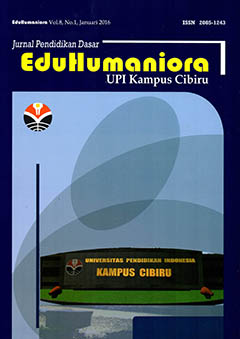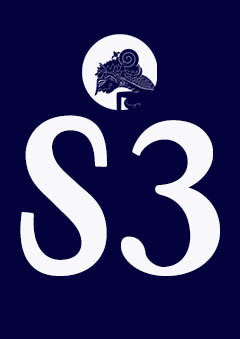ANALYSIS OF TEACHERS' PEDAGOGICAL COMPETENCE IN MUSIC LEARNING AT ELEMENTARY SCHOOL
Abstract
This research addresses the challenge of limited knowledge and ability among classroom teachers in teaching music, especially in elementary schools without dedicated music teachers. The study aims to explore how class teachers implement their pedagogic competence in teaching music at Muhammadiyah Sokonandi Elementary School. Employing a qualitative approach, the research focuses on class II and class V teachers as the subjects. Data collection techniques encompassed observation to assess various aspects, including teachers' understanding of educational theories, practices, technology integration, teacher-student communication, and assessment methods. Additionally, interviews were conducted with grades II and V teachers, concentrating on nine indicators of teacher pedagogic competence in teaching music. These indicators encompassed understanding student characteristics, learning theories, curriculum development, and student potential. Complementing the data obtained from interviews and observations, documentation, such as descriptions of pedagogic competencies and photographs during research activities, was utilized. Data analysis involved data reduction, presentation, and drawing meaningful conclusions. The findings disclosed shortcomings in the application of the nine indicators of pedagogic competence in teaching music, specifically regarding the mastery of learning theory and facilitating student development. In conclusion, this research illuminates the challenges faced in music education at the elementary school level and contributes to enhancing the overall quality of music education. It underscores the significance of improving teacher pedagogic competence in music education to provide enriched learning experiences for students. The insights gained from this study can aid in the development of effective strategies for promoting music education in elementary schools.
Keywords
Full Text:
PDFReferences
Bizami, N. A., Tasir, Z., & Kew, S. N. (2023). Innovative pedagogical principles and technological tools capabilities for immersive blended learning: a systematic literature review. Education and Information Technologies, 28(2), 1373–1425. https://doi.org/10.1007/s10639-022-11243-w
Blegur, J., Lumba, A. J., & Ngongo, M. (2023). Tracing physical education teachers’ teaching difficulties in online era using teaching skill indicators. Pegem Journal of Education and Instruction, 13(1), 125–134. https://doi.org/10.47750/pegegog.13.01.15
Burai, R., & Kardum, R. B. (2022). An Analysis of Learning Outcomes Achieved through Pedagogical Competencies Acquisition Programme in the Republic of Croatia. International Journal of Instruction, 15(2), 641–658. https://doi.org/10.29333/iji.2022.15235a
Burns, S., Barron, C., Saleem, S., Jegatheeswaran, C., Jenkins, J., & Perlman, M. (2023). Examining interactions between educators and across children: Evaluating the validity of the responsive interactions for Learning - Educator-Child Dyad version. Early Childhood Research Quarterly, 62, 405–416. https://doi.org/10.1016/j.ecresq.2022.10.002
Cheng, Z., Wang, H., Zhu, X., West, R. E., Zhang, Z., & Xu, Q. (2023). Open badges support goal setting and self-efficacy but not self-regulation in a hybrid learning environment. Computers & Education, 197, 104744. https://doi.org/10.1016/j.compedu.2023.104744
Concina, E. (2023). Effective Music Teachers and Effective Music Teaching Today: A Systematic Review. Education Sciences, 13(2), 107. https://doi.org/10.3390/educsci13020107
Falloon, G. (2020). From digital literacy to digital competence: the teacher digital competency (TDC) framework. Educational Technology Research and Development, 68(5), 2449–2472. https://doi.org/10.1007/s11423-020-09767-4
Hernández-Bravo, J. R., Cardona-Moltó, M. C., & Hernández-Bravo, J. A. (2016). The effects of an individualised ICT-based music education programme on primary school students’ musical competence and grades. Music Education Research, 18(2), 176–194. https://doi.org/10.1080/14613808.2015.1049255
Hsiao, J.-C., Cheng, C.-Y., & Lin, S. S. J. (2023). When the school door closes, do teachers open a window? Using diary method to investigate teachers’ online teaching practices and momentary experiences in crisis. Computers & Education, 194, 104678. https://doi.org/10.1016/j.compedu.2022.104678
Ikbal, R., Lubis, E., & Yensharti. (2019). Studi Deskriptif Mengenai Kompetensi Guru Yang Mengampu Mata Pelajaran Pengembangan Musik di SLB 2 Padang. Jurnal Sendratasik, 7(3), 77–83. https://doi.org/10.24036/jsu.v7i3.103414
Jakubik, M. (2022). Cultivating Creativity: Case: Higher Education in Finland. In In Technology, Innovation and Creativity in Digital Society: XXI Professional Culture of the Specialist of the Future (pp. 242–255). https://doi.org/10.1007/978-3-030-89708-6_21
Kelly-McHale, J. (2013). The Influence of Music Teacher Beliefs and Practices on the Expression of Musical Identity in an Elementary General Music Classroom. Journal of Research in Music Education, 61(2), 195–216. https://doi.org/10.1177/0022429413485439
Listari, A., Imansyah, F., & Marleni. (2022). Analisis Peran Guru Dalam Pembelajaran Seni Musik Di Sekolah Dasar Terhadap Siswa Kelas V Tahun 2021. Jurnal Ilmu Pendidikan, 2(2), 423–432. https://doi.org/https://doi.org/10.31004/irje.v2i2.3411
Lock, J., & MacDowell, P. (2022). Introduction: Meaningful Immersive Learning in Education. In Immersive Education (pp. 1–12). Springer International Publishing. https://doi.org/10.1007/978-3-031-18138-2_1
Mumtaz, S. (2000). Factors affecting teachers’ use of information and communications technology: a review of the literature. Journal of Information Technology for Teacher Education, 9(3), 319–342. https://doi.org/10.1080/14759390000200096
Nada, C. I., & Legutko, J. (2022). “Maybe we did not learn that much academically, but we learn more from experience” – Erasmus mobility and its potential for transformative learning. International Journal of Intercultural Relations, 87, 183–192. https://doi.org/10.1016/j.ijintrel.2022.03.002
Ng, D. T. K., Leung, J. K. L., Su, J., Ng, R. C. W., & Chu, S. K. W. (2023). Teachers’ AI digital competencies and twenty-first century skills in the post-pandemic world. Educational Technology Research and Development, 71(1), 137–161. https://doi.org/10.1007/s11423-023-10203-6
Nurapipah, Yundira, A. R., Agustina, N., & Alfira, A. (2020). Analisis kompetensi pedagogik guru dalam mata pelajaran seni budaya dan keterampilan terhadap kreativitas peserta didik. Seminar Nasional Ilmu Pendidikan Dan Multidisiplin, 3, 128–136.
Prasetyono, H., Abdillah, A., Djuhartono, T., Ramdayana, I. P., & Desnaranti, L. (2021). Improvement of teacher’s professional competency in strengthening learning methods to maximize curriculum implementation. International Journal of Evaluation and Research in Education (IJERE), 10(2), 720–727. https://doi.org/10.11591/ijere.v10i2.21010
Regelski, T. (2002). On “Methodolatry” and Music Teaching as Critical and Reflective Praxis. Philosophy of Music Education Review, 10(2), 102–123. https://doi.org/10.2979/PME.2002.10.2.102
Setiawan, A., Mering, A., & Istiandini, W. (2018). Kompetensi Pedagogik Guru Seni Budaya Dalam Pembelajaran Seni Musik di SMA Kemala Bhayangkari Kubu Raya. Jurnal Pendidikan Dan Pembelajaran, 7(8). https://doi.org/http://dx.doi.org/10.26418/jppk.v7i8.26926
Shawer, S. F. (2010). Classroom-level curriculum development: EFL teachers as curriculum-developers, curriculum-makers and curriculum-transmitters. Teaching and Teacher Education, 26(2), 173–184. https://doi.org/10.1016/j.tate.2009.03.015
Smolentseva, A. (2023). The contributions of higher education to society: a conceptual approach. Studies in Higher Education, 48(1), 232–247. https://doi.org/10.1080/03075079.2022.2130230
Sularso, S. (2022). Pendekatan literasi musik: Upaya mengetahui persepsi mahasiswa pendidikan guru sekolah dasar tentang keragaman budaya musik Indonesia. Wiyata Dharma: Jurnal Penelitian Dan Evaluasi Pendidikan, 10(1), 1–7. https://doi.org/10.30738/wd.v10i1.12745
Surahmi, Y. D., Fitriani, E., Pradita, A. A., Ummah, S. A., & Aeni, A. N. (2022). Kompetensi Pedagogik Guru Sekolah Dasar Dalam Mengelola Pembelajaran Terpadu Pada Kurikulum 2013. Jurnal Cakrawala Pendas, 8(1), 135–146. https://doi.org/https://doi.org/10.31949/jcp.v8i1.1923
Susanto, R., Asmi Rozali, Y., & Agustina, N. (2019). Development of Pedagogical Competency Models for Elementary School Teachers: Pedagogical Knowledge, Reflective Ability, Emotional Intelligence and Instructional Communication Pattern. Universal Journal of Educational Research, 7(10), 2124–2132. https://doi.org/10.13189/ujer.2019.071010
Unger, F., & Sann, U. (2023). Promoting Self-Determination and Motivation as Leadership Skills: A Didactics to Strengthen Autonomy Support and the Importance of Role Models in Social Work Management Education. In Handbook of Applied Teaching and Learning in Social Work Management Education (pp. 309–337). Springer International Publishing. https://doi.org/10.1007/978-3-031-18038-5_16
DOI: https://doi.org/10.17509/eh.v16i1.60242
Refbacks
- There are currently no refbacks.
Copyright (c) 2024 EduHumaniora | Jurnal Pendidikan Dasar Kampus Cibiru
EduHumaniora: Jurnal Pendidikan Dasar
Published in collaboration Program Studi PGSD UPI Kampus Cibiru
and
HDPGSDI
This work is licensed under a Creative Commons Attribution-ShareAlike 4.0 International License.















